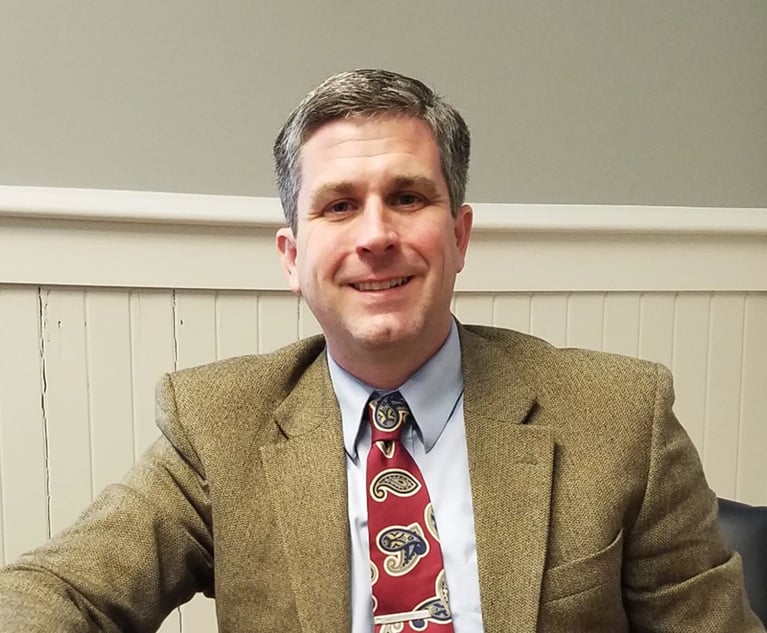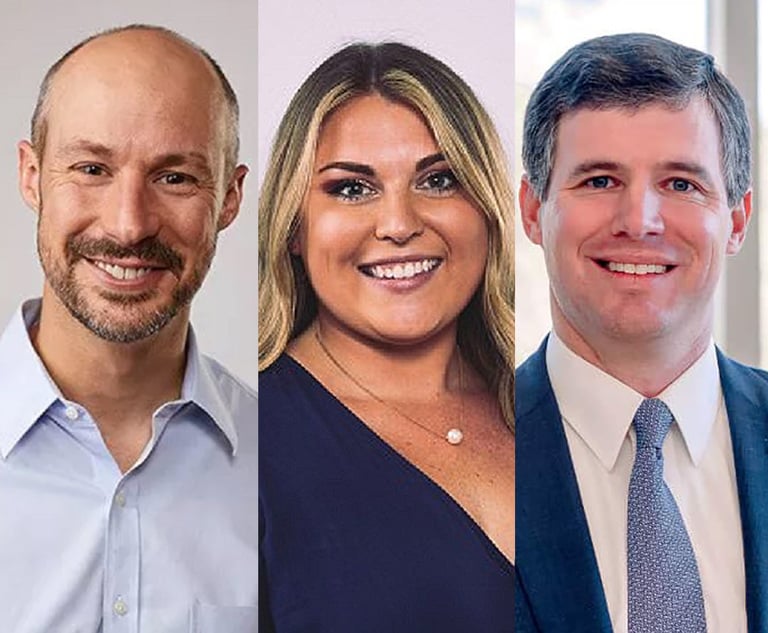Solving Conflicts of Interest of Nonattorney Staff
Not all law firms treat these issues with the seriousness they may deserve.
May 07, 2018 at 10:59 AM
6 minute read

The hiring of nonattorney staff such as a paralegal can implicate some similar ethics issues as hiring a lateral attorney. For example, a paralegal often has in their possession confidential information relating to those matters on which the paralegal provides professional services. When that paralegal moves to a new law firm, the paralegal's prior work on other matters could create conflicts of interest for the new law firm.
Not all law firms treat these issues with the seriousness they may deserve. The consequences of such omissions can be serious, but they are avoidable. The Supreme Court of Georgia provided guidance for law firms in navigating these issues to avoid a disqualifying imputed conflict of interest in its decision in Hodge v. Urfa-Sexton, LP, 295 Ga. 136 (2014).
In Hodge, a law firm hired a paralegal who had worked previously at a different law firm that was litigating a claim against one of the hiring law firm's clients. Neither the former law firm nor the paralegal disclosed any possible conflict to the hiring law firm relating to that matter. Thus, no screening procedures were implemented upon the paralegal's hiring at the new firm.
After the paralegal began working at the hiring firm, she learned that the hiring firm worked on the same matter in which her former firm was also involved, and she disclosed it internally. Immediately upon learning of the potential conflict, the hiring law firm implemented ethics screens to protect against the disclosure of any confidential information the paralegal had learned at the former law firm. Approximately two months later, the hiring law firm notified the former law firm of the potential conflict. The former firm filed a motion to disqualify the hiring firm from the case.
The majority of states that have addressed this issue have found that appropriate ethics screens may avoid an imputed conflict of interest. The state Supreme Court followed suit and held that the screening of nonattorney staff “is a permissible method to protect confidences held by nonlawyer employees who change employment.” The court explained that a nonattorney's conflict of interest may be remedied, if the law firm employing that nonattorney uses effective and appropriate screening measures and promptly discloses the conflict.
This decision helps provide a framework for law firms to avoid a disqualifying imputed conflict of interest based on the hiring of nonattorney staff. Here are the steps:
Consider Conflicts During the Hiring Process.
It is generally easiest to identify potential conflicts of interest prior to the actual hiring of nonattorney staff. Many firms will choose to use a written application that inquires about the candidate's prior legal employment, relationships with attorneys and legal experience. The hiring firm can then take that list of law firms or attorneys and run through the firm's conflict system just as they would for a lateral attorney hire. If the conflicts system reveals that the prospective nonattorney staff hire has worked for, has experience with or is related to counsel involved with matters involving clients of the firm, then the hiring firm can conduct further inquiry.
The court in Hodge agreed that “it would be prudent for a potential employer to conduct a conflict check before hiring a new nonlawyer, so as to implement appropriate screening measures and avoid the possibility of subsequent disqualification.” For many, this screening process is purely prophylactic and involves no additional action. However, if the application and follow-up reveals a potential problem, most firms will take additional steps to assess whether there is a risk of disqualification.
Is it Time To Provide Notice?
The court in Hodge seemed to have some concerns regarding the timing of the law firm's steps. Although the hiring law firm implemented screening procedures immediately, it delayed notice to the former law firm.
Upon learning of a potential conflict, even involving nonattorney staff, Georgia attorneys are “required to give prompt notice” to the other client and/or law firm, “stating the conflict and the screening measures implemented” at the hiring law firm. Firms in this situation will generally give prompt notice in writing and describe in detail the conflict and the screening measures that have been or will be implemented upon hiring.
What is Adequate Screening?
In Hodge, the Georgia Supreme Court found that the hiring law firm “implemented effective screening measures as soon as” it learned of the conflict to ensure that the paralegal “would not disclose confidential information” and had “not actually disclosed such confidential information.” Because the court approved of the screening techniques adopted by the hiring firm in Hodge, they can be instructive for law firms reviewing how to establish an effective screen.
To avoid a potential conflict in the case, the hiring law firm in Hodge:
- Instructed the paralegal not to be involved in the case in any way or to have any discussions with anyone about the case or their knowledge about it;
- Restricted access to the electronic file and notified the paralegal that appropriate screening measures would be implemented at the law firm to prevent such access;
- Implemented and confirmed electronic screening measures including steps restricting the paralegal's access to any information about the case, implementing security measures to prevent the paralegal from accessing any computerized information maintained by the law firm and testing the security measures to ensure their success;
- Removed the physical file from the general file room and securely placed it in the office of an associate; and
- Confirmed that the security measures would remain in place for the duration of the case.
Effective screening techniques are generally aimed at protecting the disclosure of confidential information, either from the screened employee to the firm or from the firm to the screened employee. These techniques can help law firms balance their goals for hiring new talent to help them serve clients with the risks inherent in potentially imputed conflicts.
Shari L. Klevens is a partner at Dentons US in Atlanta and Washington and serves on the firm's U.S. board of directors. She represents and advises lawyers and insurers on complex claims and is co-chair of Dentons' global insurance sector team.
Alanna Clair is a partner at Dentons US in Washington and focuses on professional liability and insurance defense. Shari and Alanna are co-authors of “The Lawyer's Handbook: Ethics Compliance and Claim Avoidance” and the upcoming 2019 edition of “Georgia Legal Malpractice Law.”
This content has been archived. It is available through our partners, LexisNexis® and Bloomberg Law.
To view this content, please continue to their sites.
Not a Lexis Subscriber?
Subscribe Now
Not a Bloomberg Law Subscriber?
Subscribe Now
NOT FOR REPRINT
© 2025 ALM Global, LLC, All Rights Reserved. Request academic re-use from www.copyright.com. All other uses, submit a request to [email protected]. For more information visit Asset & Logo Licensing.
You Might Like
View All

DC Lawsuits Seek to Prevent Mass Firings and Public Naming of FBI Agents
3 minute read

Apply Now: Superior Court Judge Sought for Mountain Judicial Circuit Bench
3 minute readTrending Stories
- 1States Accuse Trump of Thwarting Court's Funding Restoration Order
- 2Microsoft Becomes Latest Tech Company to Face Claims of Stealing Marketing Commissions From Influencers
- 3Coral Gables Attorney Busted for Stalking Lawyer
- 4Trump's DOJ Delays Releasing Jan. 6 FBI Agents List Under Consent Order
- 5Securities Report Says That 2024 Settlements Passed a Total of $5.2B
Who Got The Work
J. Brugh Lower of Gibbons has entered an appearance for industrial equipment supplier Devco Corporation in a pending trademark infringement lawsuit. The suit, accusing the defendant of selling knock-off Graco products, was filed Dec. 18 in New Jersey District Court by Rivkin Radler on behalf of Graco Inc. and Graco Minnesota. The case, assigned to U.S. District Judge Zahid N. Quraishi, is 3:24-cv-11294, Graco Inc. et al v. Devco Corporation.
Who Got The Work
Rebecca Maller-Stein and Kent A. Yalowitz of Arnold & Porter Kaye Scholer have entered their appearances for Hanaco Venture Capital and its executives, Lior Prosor and David Frankel, in a pending securities lawsuit. The action, filed on Dec. 24 in New York Southern District Court by Zell, Aron & Co. on behalf of Goldeneye Advisors, accuses the defendants of negligently and fraudulently managing the plaintiff's $1 million investment. The case, assigned to U.S. District Judge Vernon S. Broderick, is 1:24-cv-09918, Goldeneye Advisors, LLC v. Hanaco Venture Capital, Ltd. et al.
Who Got The Work
Attorneys from A&O Shearman has stepped in as defense counsel for Toronto-Dominion Bank and other defendants in a pending securities class action. The suit, filed Dec. 11 in New York Southern District Court by Bleichmar Fonti & Auld, accuses the defendants of concealing the bank's 'pervasive' deficiencies in regards to its compliance with the Bank Secrecy Act and the quality of its anti-money laundering controls. The case, assigned to U.S. District Judge Arun Subramanian, is 1:24-cv-09445, Gonzalez v. The Toronto-Dominion Bank et al.
Who Got The Work
Crown Castle International, a Pennsylvania company providing shared communications infrastructure, has turned to Luke D. Wolf of Gordon Rees Scully Mansukhani to fend off a pending breach-of-contract lawsuit. The court action, filed Nov. 25 in Michigan Eastern District Court by Hooper Hathaway PC on behalf of The Town Residences LLC, accuses Crown Castle of failing to transfer approximately $30,000 in utility payments from T-Mobile in breach of a roof-top lease and assignment agreement. The case, assigned to U.S. District Judge Susan K. Declercq, is 2:24-cv-13131, The Town Residences LLC v. T-Mobile US, Inc. et al.
Who Got The Work
Wilfred P. Coronato and Daniel M. Schwartz of McCarter & English have stepped in as defense counsel to Electrolux Home Products Inc. in a pending product liability lawsuit. The court action, filed Nov. 26 in New York Eastern District Court by Poulos Lopiccolo PC and Nagel Rice LLP on behalf of David Stern, alleges that the defendant's refrigerators’ drawers and shelving repeatedly break and fall apart within months after purchase. The case, assigned to U.S. District Judge Joan M. Azrack, is 2:24-cv-08204, Stern v. Electrolux Home Products, Inc.
Featured Firms
Law Offices of Gary Martin Hays & Associates, P.C.
(470) 294-1674
Law Offices of Mark E. Salomone
(857) 444-6468
Smith & Hassler
(713) 739-1250






